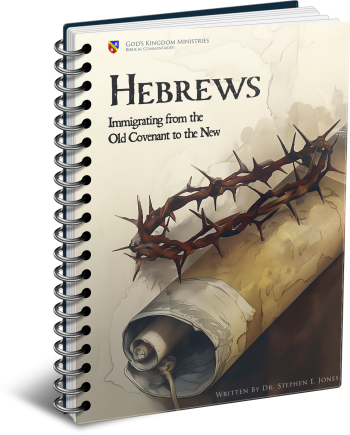Latest Posts
View the latest posts in an easy-to-read list format, with filtering options.

A chapter by chapter examination of the Book of Hebrews; this book examines the ways in which God has moved towards a better covenant with man. The historical background of the Book of Hebrews as well as contextual discussions add insight and relevance to Hebrews.
Category - Bible Commentaries

The New Covenant could not be instituted or ratified by a high priest of the Levitical Order. It could come only through a new order of priest—that of Melchizedek. This is the revelation of the book of Hebrews and the reason the book sets forth the Melchizedek Order in the seventh chapter before expounding upon the New Covenant in chapter eight.
Obviously, then, if the Old Covenant was temporary and the New Covenant permanent, there is no possible way that God would reinstate the Old Covenant through its Levitical priesthood in the Age to come. The hopes and aspirations of Jews and Christian Zionists will not be realized, though they work hard to rebuild a temple in Jerusalem, a Levitical priesthood, and aspire to resume animal sacrifices.
1 Now the main point in what has been said is this: we have such a high priest, who has taken His seat at the right hand of the throne of the Majesty in the heavens, 2 a minister in the sanctuary and in the true tabernacle, which the Lord pitched, not man.
Our high priest is immortal and in the heavens, seated in the true tabernacle, as distinct from that physical temple located in Jerusalem (when these words were written). It is a temple “which the Lord pitched, not man.” Any tabernacle or temple that men may aspire to build in Jerusalem (or any other place on earth) is not the true tabernacle of God, now that the new order of priesthood has been given authority in the earth.
3 For every high priest is appointed to offer both gifts and sacrifices; hence it is necessary that this high priest also have something to offer.
That which our High Priest of Melchizedek has to offer is not the blood of an animal sacrifice but His own blood, as we are soon told in Heb. 9:11, 12,
11 But when Christ appeared as a high priest of the good things to come, He entered through the greater and more perfect tabernacle, not made with hands, that is to say, not of this creation; 12 and not through the blood of goats and calves, but through His own blood, He entered the holy place once for all, having obtained eternal redemption.
Getting back to Hebrews 8, the author then makes the strongest renunciation possible of the Levitical priesthood, saying in verses 4 and 5,
4 Now if He were on earth, He would not be a priest at all, since there are those who offer the gifts according to the Law; 5 who serve as a copy and shadow of the heavenly things, just as Moses was warned by God when he was about to erect the tabernacle; for, “See,” He says, “that you make all things according to the pattern which was shown you on the mountain.”
Jesus was of the tribe of Judah, not of Levi. If He were ministering in an earthly temple in Jerusalem, He would have to be descended of Levi in order to minister. But being of the tribe of Judah, “He would not be a priest at all.” Why? Because the offerings in the earthly temple were only “a copy and shadow of the heavenly things.” Our High Priest does not minister in that way nor in that order. If (at His return) He were to dwell in a rebuilt physical temple made with hands in Jerusalem, He would have to return of the tribe of Levi. And then He would be no priest at all, because those animal sacrifices were an integral part of the Old Covenant which was broken and has thus passed away.
6 But now He has obtained a more excellent ministry, by as much as He is also the mediator of a better covenant, which has been enacted on better promises.
The fact that the New Covenant is a “better” one and is based on “better promises” makes it impossible for the aspirations of Jews and Christian Zionists to be fulfilled. He did not come the first time to bring about a better covenant, only to return a second time to reverse it and reinstate the WORSE covenant as beforetime.
7 For if that first covenant had been faultless, there would have been no occasion sought for a second.
Those who think that the Old Covenant was everlasting do not understand the Hebrew word olam, which is often mistranslated “everlasting” or “for ever.” The word properly means “an age, an indefinite period of time.” But indefinite does not mean unending. Exodus 40:15 says that the anointing upon the Levitical priests “shall qualify them for a perpetual [olam, “indefinitely”] priesthood throughout their generations.” That indefinite period is now known definitely, for it ended with the coming of the High Priest after the Order of Melchizedek.
Another good example is found in Numbers 25, when God made a covenant with Phineas, one of the Aaronic priests, saying in verse 13 that he would have a priesthood that was olam, indefinite in its duration. If this were truly an “everlasting covenant,” (KJV) or a “perpetual priesthood” (NASB), then God certainly lied, for the descendants of Phineas later became disqualified and were replaced by the line of Zadok in the early days of Solomon’s rule.
This abrogation of the Phineas priesthood was first spoken by a “man of God” to Eli, the high priest in the days leading to the reign of King Saul. After telling Eli that his sons were corrupt, and that he had not corrected them, the prophet said in 1 Sam. 2:30,
30 Therefore the Lord God of Israel declares, “I did indeed say that your house and the house of your father[Phineas] should walk before Me forever” [olam]; but now the Lord declares, “Far be it from Me—for those who honor Me I will honor, and those who despise Me will be lightly esteemed.”
So it is clear that God admitted promising Phineas that he would have a priesthood that was olam. But either God broke His promise, or olam did not mean everlasting or perpetual. For those who believe that God cannot lie, we are forced to believe that olam meant something less than everlasting.
And what shall we say about the so-called “everlasting covenant” (Ps. 105:10) that God made with Moses (i.e., the Old Covenant)? What about the fire that was to burn for ever (Lev. 6:13) on the altar in the outer court? What about Jonah’s “eternal” three-day ride in the belly of the whale (Jonah 2:6)? There are countless examples where olam is used of things that were temporary. To anyone who would insist that olam truly means forever, and that these things somehow prove that animal sacrifices and the Old Covenant will be reinstated after a temporary New Covenant interlude, I again point to the priesthood of Phineas as an example of the temporary priesthood of his descendants.
And so, getting back to Hebrews 8, the author tells us that the Old Covenant was not faultless,
8 For finding fault with them, He says, “Behold, days are coming, says the Lord, when I will effect a New Covenant with the house of Israel and with the house of Judah; 9 not like the covenant which I made with their fathers on the day when I took them by the hand to lead them out of the land of Egypt; for they did not continue in My covenant, and I did not care for them, says the Lord. 10 For this is the covenant that I will make with the house of Israel. After those days, says the Lord, I will put My laws into their minds, and I will write them upon their hearts. And I will be their God, and they shall be My people. 11 And they shall not teach everyone his fellow citizen, and everyone his brother, saying, ‘Know the Lord,’ for all shall know Me, from the least to the greatest of them. 12 For I will be merciful to their iniquities, and I will remember their sins no more.”
The New Covenant, then, is not just a re-invigorated Old Covenant. It is based upon an entirely different premise and is “not like the covenant which I made with their fathers.” The remarkable thing is that this is taken directly from the prophet Jeremiah. It is an Old Testament prophecy from Jer. 31:31-34. Jeremiah’s prophecy, in turn, is an explanation of Moses’ hints about the law being in their hearts (Deut. 6:6) and the circumcision of their hearts (Deut. 10:16; 30:6).
This New Covenant is made possible only through a higher order of priest than that which officiated in physical temples on earth. Only a High Priest after the Order of Melchizedek was able to bring the gift of His own blood into the heavenly temple, the “true tabernacle.” Only this new order of priest could truly bring righteousness to men, write the law upon their hearts, and circumcise their hearts.
13 When He said, “A new covenant,” He has made the first obsolete. But whatever is becoming obsolete and growing old is ready to disappear.
It cannot be stated any clearer. The Old Covenant is obsolete. The Greek word means “to advance in age, to grow old, to decay.” It is a word picture that supports the word OLD as in “Old Covenant.” Even Jeremiah insisted that Israel and Judah had broken that covenant, and that for this reason there was a need for an entirely new covenant based upon better promises.
The notion of Christian Zionism that Christians are saved by the New Covenant, while Jews are saved by the Old Covenant is not a doctrine from Jeremiah. It is based instead upon a faulty translation of the Hebrew word olam, which they take to mean unending, when, in fact, this word merely denotes an indefinite period of time and is more properly translated “an age.”